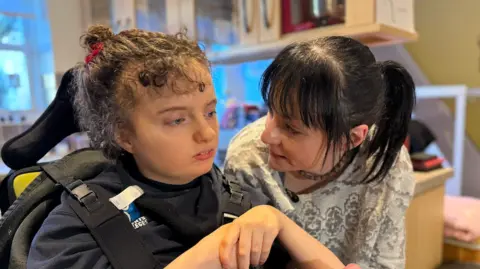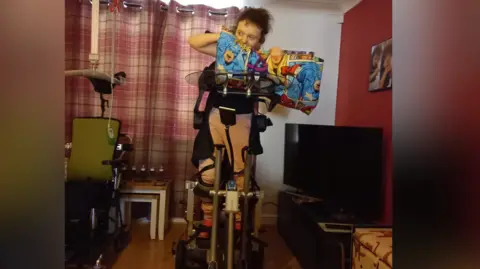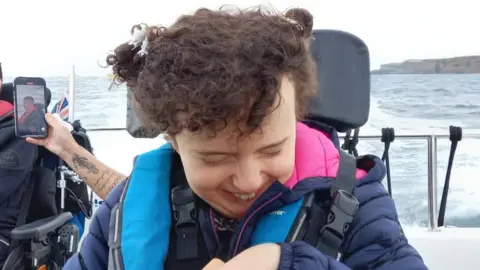Mum faces £1,000 bill to keep daughter walking
 BBC
BBCA mother faces a bill of more than £1,000 per year to maintain vital equipment for her daughter who has a rare disorder.
Kayley Burns, from Consett, County Durham, had already fundraised £20,000 to buy the Innowalk device, which is not currently available on the NHS, to allow Amelie to walk.
Supplier Made for Movement (MfM) said it was "unfortunate" the health service did "not recognise its unique technology" and said it offered payment plans to customers.
The Department of Health has been approached for comment. The NHS North East and North Cumbria Integrated Care Board (ICB) said, where people have long-term complex needs, "each situation is individually assessed".
Fewer than 100 people worldwide are believed to have MPPH syndrome, which affects brain development and restricts movement.
When medics suggested the device could help her 14-year-old walk and regain some freedom, Ms Burns said it was "life-changing".
"It helps her legs stay strong, it's also helped her hips that could easily dislocate which could mean a cast and operation for weeks, so it's basically saved her life in the sense of how she lives it," she said.
 Family photograph
Family photographMs Burns has had the equipment for two years and said she had been told she must meet the cost of its warranty and servicing, which also covers home visits from staff to ensure it is adapted to her growing daughter.
"It stresses you," she said.
"It makes you feel like you're not a good mum, you can't meet her needs, it destroys your heart."
The family had already paid for other modifications needed in the house and she had "begged" the government and health bosses to consider funding the Innowalk for Amelie and other children in a similar position, Ms Burns added.
 Family photograph
Family photographMfM's Stephen Kirkpatrick said the company was "dedicated to supporting families" but its aftercare came "at a cost that a small organisation cannot carry alone".
He said the firm understood "the annual support package costs can be a significant financial burden to families" and offered various support packages.
"It is unfortunate that the health service does not yet recognise our unique technology as a highly impactful and important piece of equipment," he said.
The ICB's interim executive chief nurse Ann Fox said it recognised Amelie's family was "doing all they can to provide the very best care".
Those with a family member with long-term complex needs "may qualify for free health and social care which is arranged and funded by the NHS and each situation is individually assessed", she said.
Follow BBC Sunderland on X, Facebook, Nextdoor and Instagram. Send your story ideas to [email protected].
